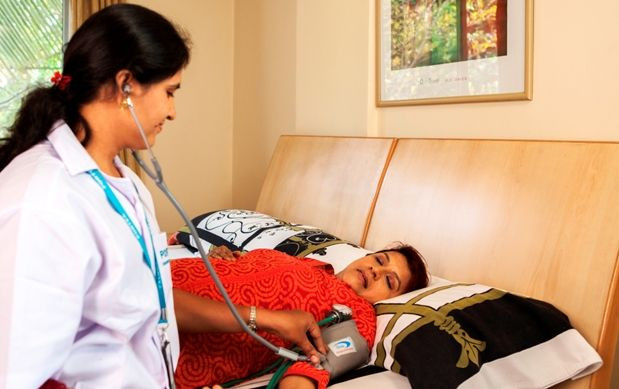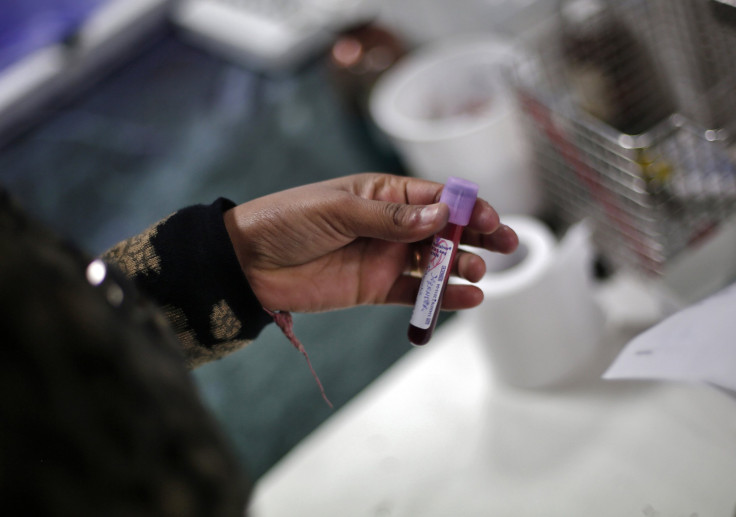New Indian Startups And Apps Improve Healthcare In Urban India Through Smartphone Technology

BANGALORE, India -- It's a busy Wednesday morning in India’s tech capital and Maryann Joseph, a human resources executive in one of the city's tech companies, is getting ready for work. But, with a frozen left shoulder that requires physiotherapy to restore normal movement, Joseph is struggling to complete her daily tasks. The nearest hospital is only about a mile away but it's peak rush hour and Joseph doesn’t fancy her chances in an auto-rickshaw on Bangalore's pothole-riddled streets. Luckily, this isn’t a problem she has to deal with.
Joseph has signed up to Portea, a new startup that matches healthcare professionals with prospective patients and arranges house visits. Joseph only has to use her phone to set a weekly appointment, at a time of her convenience, and Shweta Katariya, a young physiotherapist, puts Joseph through a set of targeted exercises aimed at relaxing her shoulder before she goes into work.
Paying for healthcare is not a new concept in a country where some 70 percent of all healthcare expenses are out-of-pocket. A study from the Institute for Social and Economic Change, Bangalore; the London School of Economics; and the University of Oxford revealed that private healthcare providers are more in demand than public providers, even among the poor. When poor people seek professional medical treatment, about 60 percent of them go to private clinics or hospitals -- the corresponding figure for the middle class is 69 percent.
Government spending on healthcare is about 1 percent of the country's GDP, and a recommendation to raise that to 2.5 percent has yet to be implemented. This leaves the field wide open for a host of startups, hospitals, clinics, testing labs, doctors, therapists and other related professionals to create a private ecosystem that is consumerizing healthcare, increasingly using the internet.
"If you go to a hospital you have to wait, and it takes a good two to two-and-a half hours for the whole process. Here, you fix a time, and the therapist comes in ... I used to have a lot of pain, I'm much better now," Joseph, a first-time user of Portea, who found out about the two-year-old company on Facebook after a friend used the startup's services, said. "It also ensures that I don't neglect the problem."
"That's the whole point," Meena Ganesh, Portea's chief executive, said in a phone interview. "The more access you provide at the right time and cost, the more likely that people will use healthcare at the right time. If you use it at the right time, the cost of care overall goes down in the system."

Healthcare for the Rich
But the extra service comes at a price: A house visit by a Portea-employed doctor starts at 700 rupees ($10.5), typically up to twice as much as what a general physician might charge at a clinic in Bangalore. Each of Joseph's physiotherapy sessions cost her about 500 rupees and she receives a discount for purchasing a set of multiple sessions -- she’s on her fifth.
These rates, while affordable for India’s growing middle class, are out of reach for the vast majority of India’s rural poor. "We are currently in the urban centers and the tier-2 cities. Right now I don't see the model extending to rural areas, but, I don't know, if we are able to use a technology-led model we might be able to service those locations as well," Ganesh said. "Right now, it is a big-city model."
Another factor is that these startups depend on the internet, which means their beneficiaries are typically urban white-collared professionals, short on time, but confident English speakers who are informed enough to use smartphone apps from where they can carry out online and mobile payments. In the long term, Ganesh believes that advances in technology might again help bring the service to a larger market.
Forus Health, a Bangalore startup is showing early signs of becoming a hardware success in a world of software startups. The venture has developed a low-cost portable eye-screening device that could go a long way in the early detection of blindness among people living in remote parts of India. But, for now, healthcare startups are focusing on where the money is -- in India's cities.
‘Doctor in your Pocket’
For internet-savvy consumers, the options are legion. In addition to Portea, which operates by recruiting doctors and specialists as full-time staff and sending them out on house calls, other startups are focusing on helping people find the best doctor for their particular problem. Practo, in Bangalore, is one such startup, with an army of sales staff fanning out across the country to add doctors to its network, in addition to millions of dollars in venture capital money that’s enabling the company to expand overseas.
Lybrate.com, a New Delhi-based rival to Practo, is targeting a similar crowd. Mrinal Upadhyay, a 36-year-old entrepreneur in the nation's capital, describes the whole phenomenon as having a "doctor in your pocket." He uses Lybrate’s smartphone app on his iPhone 6 to look for medical advice. One of its most attractive features, he told International Business Times, is a Quora-like function that allows people to post questions and receive an answer from a medical expert on Lybrate's network.
Another feature allows users to post questions anonymously, as a 26-year-old software engineer in the western Indian city of Pune discovered. The software programmer didn't want to be identified as he had used Lybrate to find a sex therapist. "You can post questions and seek advice anonymously," the person recalled, and said the specialist who responded to his questions was enormously helpful.

The question function of the app is free to use, Saurabh Arora, Lybrate's chief executive, said in a phone interview. It's only when a user wants to consult a specific doctor for a more detailed one-on-one consultation that a payment is involved -- and most standard payment options are available.
The app allows people to take pictures of their records and share them with their doctors, similar to how people share photos on the free instant messaging service WhatsApp. Arora says the app’s been downloaded some 2 million times, and received as many as 200,000 hits from people every day. An individual may also, Arora said, borrow their friend or relative’s smartphone if they don’t have one themselves.
Almost two-thirds of Lybrate’s users are from India’s big cities but the company is actively trying to spread the word about its service in smaller towns, given that the penetration of cheap Android smartphones is rising in India.
Privacy Concerns
Lybrate users share their data with doctors of their choice on the startup's network, raising an immediate question about the company’s data protection and security measures. Arora told IBT that the app is secure, since it uses Amazon.com's internet-based computer servers and has “bank-level data encryption technology.”
“Data is accessible only to registered users and their chosen doctors, and users can wipe their data when they need to,” Arora said. "Users decide which doctor they want to contact and what level of information they want to share.”
In a written statement to IBT, Portea declared: "Information on a Portea patient's medical condition is only available to the patient and the family member authorized to receive such info by the patient. Such information is not shared with anyone else and this is a policy that we follow as a company."
The success of Portea, Lybrate and other healthcare start-ups hinges on securing users’ sensitive information. "The starting point is, it's users' data, users should control it," Arora told IBT.
But there are limitations to this control under Indian law: India does not have a dedicated medical data privacy law such as HIPAA (Health Insurance Portability and Accountability Act) in the U.S. When the government requests personal data, companies must comply with applicable laws, Arora told IBT, which may include sharing healthcare data if it’s deemed in the public interest.
The lack of a strong medical privacy law could become a major obstacle for healthcare startups, but Arora said patients’ data are protected under the country's Information Technology Act, 2000 and Information Technology Rules, 2011.
"We comply with these laws. On top of it, we have stringent norms internally to ensure all the data that we have is safe and secure," he said.
© Copyright IBTimes 2024. All rights reserved.





















